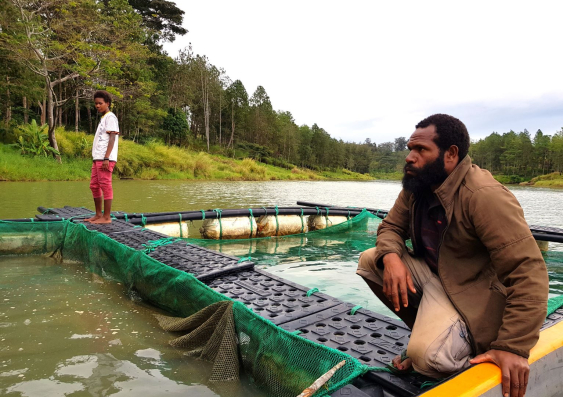Fish farming for change: empowering Papua New Guinea communities
A UNSW Sydney researcher has received $2.6 million in funding to expand fish farming and its positive social impact in Papua New Guinea.
A UNSW Sydney researcher has received $2.6 million in funding to expand fish farming and its positive social impact in Papua New Guinea.

Yolande Hutchinson
Corporate Communications
0420 845 023
y.hutchinson@unsw.edu.au
Associate Professor Jes Sammut from UNSW Science has received more than $2.6 million from the Australian Centre for International Agriculture Research for a project that will build on previous work to improve fish farming in Papua New Guinea (PNG).
“We have transformed lives under our previous projects. It is exciting to be funded to do more in PNG,” A/Prof. Sammut said.
“Over the last 13 years I have witnessed many positive societal changes where we have introduced fish farming. The increase in protein in diets is the most obvious, but the increase in self-esteem and pride in farmers is also uplifting. I am particularly heartened to see the peace and hope that fish farming has brought to people who were once engaged in long-term tribal fighting.”
In collaboration with the National Fisheries Authority (NFA), the new project will introduce technologies to boost commercialisation through larger farms and expand training networks for fish farming.
Jacob Wani, project lead from the NFA, said: “Jes and I share a common goal for PNG – we both want to see more people access protein and to improve their income and livelihoods.
“We have a multi-disciplinary team across the two countries working as equals. We respect each other and tackle the challenges as a unified team regardless of the agency we work for.”
The industry has grown from around 11,000 fish farms in 2009 to more than 70,000 farms in 2023. The success of the projects has been largely attributed to the strong trust-based relationships the team has developed with PNG farmers.
The new project will build on work undertaken by A/Prof. Sammut and Mr Wani since 2009.
“Over 50 per cent of children suffer from stunting in PNG due to a lack of protein in their diet. Adults suffer from obesity but are still malnourished due to high carb and low protein diets,” A/Prof. Sammut said.
“The work we have done to improve fish farming has led to an increase in protein consumption and better health outcomes.”
In terms of fish production, the project has delivered cheaper fish feed options for small-scale farming, trained thousands of farmers, established new fingerling production methods, and contributed to certificate courses in aquaculture.
“Other positive impacts resulting from the income and sense of purpose provided by fish farming are believed to include reduction in crime and tribal war, less domestic violence against women, and better education opportunities,” A/Prof. Sammut said.
The projects have introduced fish in many prisoners’ diets and prisoners have taken up fish farming as a livelihood on their release. Some school teachers use fish farming to teach students about science, mathematics, agriculture and economics – activities that will continue under the new project.
“While our earlier projects focused on small-scale production of fish farming – which we will continue to support – this project provides scientific support for sustainable cage-based fish farming in reservoirs and more intensive pond-based farming,” A/Prof Sammut said. “This is farming on a much larger scale.”
The new project will review the optimal size for reservoir-based fish farming to avoid negative environmental impacts. It will also test new fish feed and farming practices to reduce cost and farm waste and reduce PNG’s dependency on imported fish feeds.
UNSW and ANSTO, a project partner, have developed nuclear technologies and methods from related projects that will be applied to fish nutrition and environmental studies.
“Access to commercial fish feed is scarce in PNG, and formulated feeds can be more expensive than in neighbouring countries. We addressed and solved this issue for small-scale farming. Now we need to research alternative feeds and feeding practices for larger scale fish farming,” A/Prof. Sammut said.
Previous projects empowered women and made them more visible as fish farmers. The new project will contribute to programs that support women who are victims of sorcery (bewitchment) accusation related violence.
The PNG Tribal Foundation is a key partner on the gender-related components of the project. UNSW, the NFA and the PNG Tribal Foundation will introduce fish farming to the Village of Hope, a model for sustainable livelihoods and peaceful communities in PNG.
“This project continues the successful collaboration with NFA and other partners. Most importantly, we will be growing knowledge networks and building the skills of more farmers to help disseminate sustainable farming practices across PNG,” A/Prof. Sammut said.
Mr Wani said: “NFA and UNSW have had a very productive collaboration for over a long time. We train UNSW students in PNG, and UNSW trains NFA staff and students at UNSW and ANSTO, as well as on the project in PNG. This capacity building is a two-way process that benefits PNG and Australia.”
Partners in the project include UNSW, the National Fisheries Authority of PNG, the PNG National Department of Agriculture and Livestock, the PNG Tribal Foundation, the Sisters of Notre Dame and ANSTO.